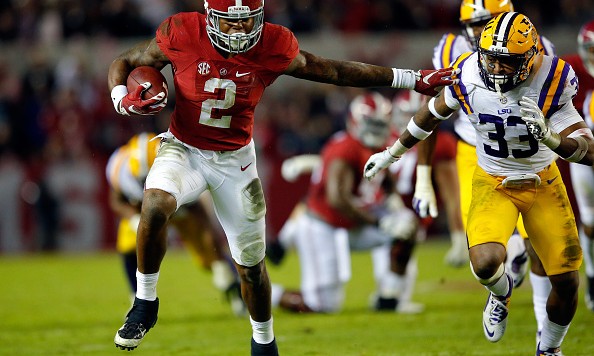As the only team making the College Football Playoff for the second straight season, Alabama is attempting to do what it couldn’t in its first go-around: advance to the national championship game.
If the Crimson Tide are going to play on Jan. 11 in Glendale, they will need to excel in what they have done all season long: run the ball consistently and stop the run.
Derrick Henry clearly had an all-time great season en route to winning the Heisman Trophy. Alabama has been riding Henry heavily to advance to this point. This includes 90 carries in the past two games, and two other games since mid-October with at least 30 totes in a game. To put that in perspective, those four games fall just short of Henry’s workload all of last season.
With the back carrying the load for the offense, how much he has in the tank will be crucial. One thing is for sure: He will not be limited to just 13 carries as he was in the Ohio State loss last season… even if Alabama falls behind.
On defense, getting a push up front will be huge for the Tide. While their rush defense is tops in the nation, Michigan State is also ranked ninth in the same category. The Spartans are certainly no slouch and have seen top backs a lot this season.
Michigan State held a dynamic Oregon ground attack to 123 yards and Ohio State to just 46… although Ezekiel Elliott thinks he knows why. Getting a push up front and allowing Henry to get going downhill will be the offensive keys for Alabama in the contest.
The Tide will also need to stay committed to the run, as Jake Coker is somehow making Alabama fans miss the days of Greg McElroy, A.J. McCarron, and Blake Sims. While those are not names to write home about, the trio showed more consistency and the ability to manage games well. Coker has shown that he can manage the game at best; asking for big passing plays might be too much.
While the quarterback is completing nearly 66 percent of his passes, Coker has also thrown eight interceptions. The passing offense has limited explosiveness — Coker has struggled to get the ball down the field. The limitations at quarterback make sticking to the running game even more important. Coker is near the middle of the SEC with under eight yards per pass attempt and just over 190 passing yards per game.
Coker has shown the ability to complete more underneath passes, which will also be crucial in limiting mistakes and letting Henry win the game.
On the other side of the ball, Michigan State also faces some questions at the quarterback position. While Connor Cook clearly has a talent advantage over Coker, making mistakes in big games has been a recurring pattern. One particular detail to pay attention to is Cook’s arm strength. He couldn’t push the ball down the field in the Big Ten Championship Game against Iowa because of his nagging shoulder injury. He should be physically fit for this game, but one can’t be certain about the extent to which he can zip his passes on all sorts of route combinations. Any weakness must be punished by Bama’s defensive backs.
That said, stopping the run will be the main task for the Tide’s top-rated rushing defense. Alabama is, once again, huge and fast up front. However, the semifinal situation was similar last season, and Alabama allowed Elliott to run wild in the Sugar Bowl. The key will be to prevent that scenario from emerging again, thereby forcing Cook to beat the Tide in key moments.
If Alabama is able to complete these tasks, it will make it one step further than last season. It all seems so simple, but a dogged opponent from the Big Ten is going to make this task very difficult.

